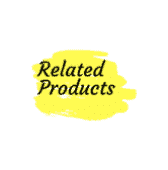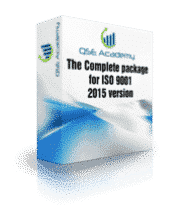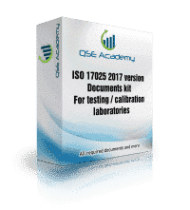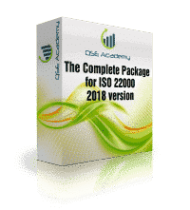BRC V9 Package
2025-03-27 12:11BRC V9 Package
Get your accreditation at the lowest possible cost


BRC V9 complete package
V9 version



Price : 489 $
Certification Made Simple and Accessible for Your Business
The complete BRC V9 package is a comprehensive document package that contains everything from templates of procedures, processes, forms, checklists, tools, detailed guides, and instructions needed to:
– Start your BRC V9 process.
– Create your BRC V9 documentation.
– Quickly achieve BRC V9 certification.
– Benefit from a BRC V9 management system that is simple and adapted to the needs of your organization.

Why start with a blank page. Start your Project TODAY, and save up to 80% on your time and money.

This package comes with 1 hour Live 1-to-1 Online Session with ISO consultant, document reviews, continual email support for 12 months and regular update service.

Cost-Effective Implementation: Much cheaper than an on-site consultant, and requires much less time than doing it from scratch
BRC Version 9 Complete Package
• Added Value: All BRC V9 requirements have been developed into an efficient process that adds operational value to your organization and consequently increases productivity.
• Effective: Minimal effort is required to follow procedures necessary to meet all requirements of BRC V9.
• Simplified: Bureaucracy and excessive paperwork have been eliminated from each process to make it easy – while remaining fully compliant with BRC V9.
Start your Project TODAY, and save up to 80% on your time and money.
The all-in-one document package for BRC V9 version
Save time, save money and simplify the accreditation process.
Documents included:

Forms
This package provides you with the following features:
- Full lifetime access
- Access on laptop, desktop, or mobile
- Certificate of completion
This Package Includes
- Procedures:
- Quality Management System Procedure
- Management Responsibility Procedure
- Food Safety Plan Procedure (HACCP)
- Hazard Analysis Procedure
- Food Defense Plan Procedure
- Food Fraud Mitigation Procedure
- Allergen Management Procedure
- Product Development Procedure
- Supplier Approval and Monitoring Procedure
- Internal Audit Procedure
- Non-Conforming Product Procedure
- Corrective and Preventive Action Procedure
- Control of Documents and Records Procedure
- Training and Competence Procedure
- Traceability Procedure
- Validation and Verification Procedure
- Complaint Handling Procedure
- Product Recall Procedure
- Product Withdrawal Procedure
- Incident Management Procedure
- Calibration and Maintenance Procedure
- Pest Control Procedure
- Hygiene and Cleaning Procedure
- Environmental Monitoring Procedure
- Waste Management Procedure
- Storage and Distribution Procedure
- Labeling and Packaging Procedure
- Equipment and Utensil Management Procedure
Records and Forms:
- HACCP Team Meeting Record
- Hazard Analysis Worksheet
- CCP Decision Tree Worksheet
- HACCP Plan Summary
- Food Defense Assessment Form
- Food Fraud Vulnerability Assessment Form
- Allergen Risk Assessment Form
- Supplier Evaluation and Approval Form
- Internal Audit Schedule
- Internal Audit Report
- Non-Conformance Report
- Corrective Action Request
- Training Record
- Traceability Test Record
- Validation and Verification Record
- Customer Complaint Log
- Product Recall Log
- Incident Report
- Calibration Record
- Maintenance Log
- Pest Control Inspection Report
- Cleaning Schedule and Record
- Environmental Monitoring Record
- Waste Disposal Record
- Storage and Distribution Record
- Label Approval Form
- Equipment and Utensil Log

Manual and quality policy
- BRC V9 Quality and Food Safety Management System Manual
Others:
- Site Map and Process Flow Diagrams
- Organizational Chart
- Job Descriptions
- BRC V9 Gap Analysis Tool
- Risk Assessment

SOPs
- SOP for Raw Material Receiving
- SOP for Storage of Raw Materials
- SOP for Handling and Storage of Packaging Materials
- SOP for Pre-Operational Inspection and Cleaning
- SOP for Personal Hygiene and GMPs
- SOP for Hand Washing and Sanitizing
- SOP for Temperature Control and Monitoring
- SOP for Product Inspection and Testing
- SOP for In-Process Quality Control
- SOP for Finished Product Release
- SOP for Cleaning and Sanitizing Equipment
- SOP for Allergen Control and Cross-Contact Prevention
- SOP for Foreign Material Control
- SOP for Product Identification and Traceability
- SOP for Glass and Brittle Plastic Control
- SOP for Maintenance and Repair
- SOP for Pest Management
- SOP for Water Quality Monitoring and Control
- SOP for Air Quality Monitoring and Control
- SOP for Waste Handling and Disposal
- SOP for Emergency Procedures
- SOP for Shipping and Receiving

BRC V9 Documentation Requirements Explained
The BRCGS Food Safety Version 9 Documentation Package is a vital resource for food manufacturers, processors, and packagers aiming to implement a world-class food safety and quality management system. This package provides all the essential documentation needed to comply with BRCGS Global Standard for Food Safety Issue 9, ensuring food safety, regulatory compliance, and audit readiness.
Well-structured documentation is the foundation for maintaining product integrity, managing risks, and meeting customer and regulatory requirements. From hazard analysis to supplier approval, this package helps streamline certification efforts and promote continuous improvement.
Why BRCGS Food Safety Version 9 Documentation Matters
BRCGS Issue 9 sets globally recognized standards for food safety, quality, and operational criteria. Proper documentation not only ensures compliance but also demonstrates your organization’s commitment to food safety culture, traceability, and legal due diligence. It helps you satisfy retailer requirements and maintain access to key markets.
This package includes:
Key BRCGS Food Safety Version 9 Documentation Categories
| Document | Purpose in BRCGS Food Safety System |
|---|---|
| Food Safety and Quality Policy | Communicates senior management’s commitment to food safety and product quality |
| HACCP Plan and Prerequisite Programs | Identifies and manages food safety hazards through a preventive approach |
| Product Specifications and Traceability Records | Ensures clarity and full traceability across the supply chain |
| Food Safety Culture Plan | Promotes accountability and engagement at all organizational levels |
| Risk Assessments and Vulnerability Studies | Identifies risks including food fraud and defense vulnerabilities |
| Internal Audit and Corrective Action Logs | Measures system performance and drives continuous improvement |
| Approved Supplier List and Evaluations | Ensures raw material and service suppliers meet safety and quality standards |
| Complaint, Non-Conformity, and Recall Procedures | Enables structured handling of product issues and effective traceability |
Core BRCGS Food Safety Version 9 Documentation Requirements
Management System Documentation
BRCGS V9 requires a documented food safety management system that supports legal compliance, product safety, and continual improvement. This package includes:
Food Safety and Quality Manual – Describes the overall structure of the BRCGS-compliant system.
Organizational Structure and Responsibility Matrix – Defines accountability and reporting lines.
Document Control and Retention Procedures – Ensures documents are approved, reviewed, and accessible.
Senior Management Review Records – Demonstrates leadership engagement and strategic oversight.
Staff Training and Competency Records – Proves staff are equipped to perform food safety-related tasks.
Operational and Risk Control Documentation
Controlling hazards and processes is essential to ensuring consistent product quality and safety. This package includes:
HACCP Flow Diagrams and Hazard Analysis Worksheets – Visual tools for understanding and controlling risks.
Cleaning Schedules and Sanitation Records – Ensures hygiene and reduces contamination risk.
Pest Control Contracts and Logs – Documents regular monitoring and actions taken to prevent infestation.
Product Inspection and Testing Procedures – Verifies product compliance with defined specifications.
Maintenance and Calibration Logs – Ensures equipment reliability and measurement accuracy.
Verification, Monitoring, and Improvement Documentation
BRCGS V9 emphasizes measurable performance and a proactive approach to food safety. This package includes:
Internal Audit Schedules and Reports – Evaluates compliance and system performance.
Non-Conformance and Corrective Action Reports (NC/CAPA) – Tracks failures and system improvement actions.
Trend Analysis Records – Identifies patterns in complaints, rejections, or audit findings.
Mock Recall Test Records – Ensures traceability systems can perform under pressure.
Continuous Improvement Plans – Helps reduce risks and drive food safety excellence.
Legal, Regulatory, and Supporting Documentation
Product Defense and Food Fraud Mitigation Plan – Protects against intentional contamination and substitution.
Supplier Agreements and Material Specifications – Defines supply chain safety and quality expectations.
Customer Requirements Matrix – Maps and tracks specific customer food safety demands.
Training Programs and Cultural Awareness Plans – Reinforces food safety behaviors and responsibilities.
Emergency Response Procedures – Prepares the site for unexpected events impacting product safety.
Ensure Compliance with BRCGS Food Safety Version 9 Today!
Complying with BRCGS Issue 9 may seem complex, but with the BRCGS Food Safety Documentation Package, your organization will have every essential template and procedure needed to build a strong, audit-ready food safety management system. From documentation to continuous improvement, this package helps you meet global standards and customer expectations.
💡 Get started today and elevate your food safety system with a structured, reliable, and BRCGS Food Safety Version 9-compliant documentation package!
90 Days Money Back Guarantee

If for whatever reason during the FIRST 90 days of your purchase, you are not satisfied for any reason, simply contact support@qse-academy.com and our support team will issue you an immediate and full refund.
The package includes all the documents you need to comply with BRC V9 – these documents are fully acceptable by the accreditation audit.
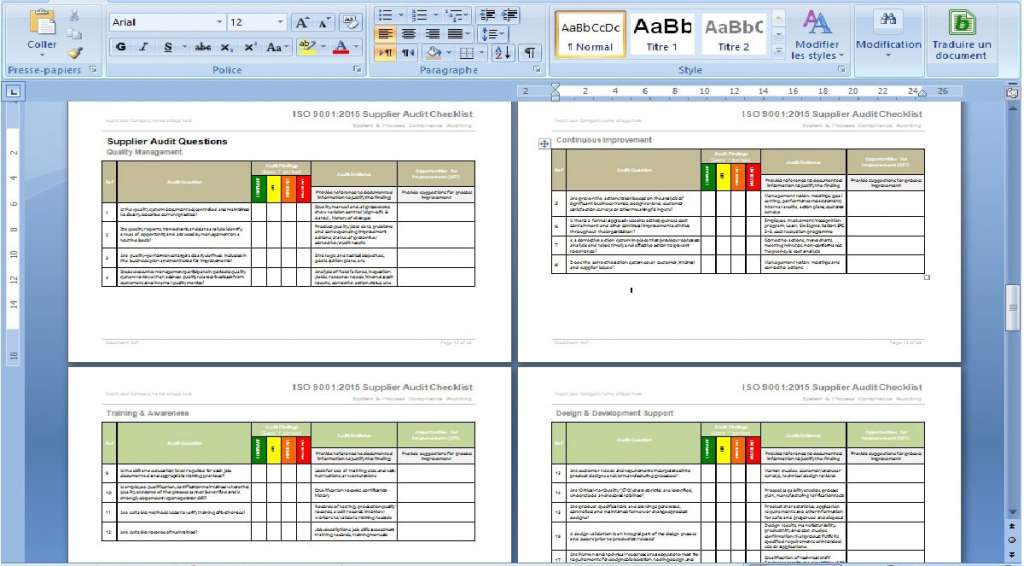
All documents are in MS Word or MS Excel, to make them very easy to customize for your business. You can customize them by adding company logos and colors, and edit headers and footers to match your favorite style.

We have already completed about 90% of the information requested on the documents. To complete them you must fill in only the name of the company, the responsible parties, and any other information unique to your company. you will be guided through the process, commenting on the elements that are needed and those that are optional.
We presented the BRC V9 documentation, so as to assure all its users that they have completed everything accurately and with the utmost efficiency.
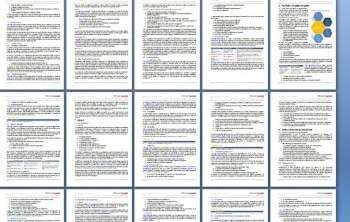
All the documents are made so that you can follow the proposed order perfectly, which allows you to make sure that nothing is missing, and that no one gets lost in the process.
The included comments and flowcharts help your staff understand each document and its usefulness, which helps you to make quality management more fluid, and processes easier to follow.
Features of the complete BRC V9 Kit
Price: 489 $
– Documentation included: 58 documents for the implementation of BRC V9
– MS Office 2007 format, MS Office 2010, MS Office 2013
– Language: English
– Documents are fully editable – just enter the information specific to your business.
– Acceptable for the BRC V9 accreditation audit? Yes, all the documents required by BRC V9 are included, as well as the quality policy and the current but optional procedures.
Instant Delivery – The package is downloadable immediately after purchase
Free Consultation – In addition, you can submit two complete documents for review by professionals.
Created for your business – The models are optimized for small and medium businesses.


Complete BRC V9 Package
The complete kit to implement BRC V9
Price : 489 $
Total Implementation Duration: 8 Months
BRC V9 Implementation Project Plan
Achieving BRC V9 compliance is a significant milestone for any organization, signifying a commitment to quality and food safety. Our expert consultants are here to guide you through every step of the implementation process, from initial consultation and gap analysis to final assessment and certification. With our comprehensive project plan, tailored training programs, and dedicated support, we ensure your organization meets all BRC V9 requirements efficiently and effectively. Partner with us to enhance your organization’s credibility, improve operational processes, and gain international recognition. Let us help you achieve excellence in food safety management.
Introduction: Senior Management Commitment (BRC V9 Section 1) (Duration: 1 Month)
Introductory Tasks
1.1 Demonstrate Management Commitment
Task: Demonstrate Management Commitment
- Description: Develop and document a statement from senior management demonstrating their commitment to BRC V9, including a commitment to food safety, continuous improvement, and resource allocation.
- Deliverables: Management commitment statement.
- Meeting: Review with the senior management team.
Task: Develop a Food Safety Culture Plan
- Description: Create a plan to establish a positive food safety culture, including employee involvement, leadership actions, and methods for measuring improvements.
- Deliverables: Food safety culture plan.
- Meeting: Review plan with senior management.
Task: Set Up Continuous Improvement Mechanism
- Description: Develop procedures to ensure continuous improvement within the food safety and quality management system, including corrective actions, root cause analysis, and performance monitoring.
- Deliverables: Continuous improvement process documentation.
- Meeting: Internal meeting to establish roles and monitor progress.
Section 1: Hazard and Risk Management (BRC V9 Section 2) (Duration: 2 Months)
2.1 Implement a HACCP-Based Food Safety System
Task: Conduct a HACCP Review
- Description: Review the existing HACCP plan or develop a new one based on the BRC V9 framework. Ensure it includes hazard identification, risk analysis, control measures, and verification steps.
- Deliverables: Updated HACCP plan.
- Meeting: Review HACCP plan with the HACCP team.
2.2 Validate Critical Control Points (CCPs)
Task: Validate and Monitor CCPs
- Description: Identify critical control points within the production process and validate them to ensure they are effective in mitigating food safety risks.
- Deliverables: CCP validation report.
- Meeting: CCP monitoring review with HACCP team.
2.2 Conduct Hazard Analysis
Task: Perform Comprehensive Hazard Analysis
- Description: Conduct a hazard analysis to identify biological, chemical, and physical hazards that could affect food safety and assess their likelihood and severity.
- Deliverables: Hazard analysis report.
- Meeting: Internal review with HACCP team.
Section 2: Food Safety and Quality Management System (BRC V9 Section 3) (Duration: 2.5 Months)
3.1 Documented Food Safety and Quality Management System
Task: Develop Food Safety and Quality Manual
- Description: Create or update the food safety and quality manual in compliance with BRC V9. Ensure it includes policies, procedures, and records for monitoring and maintaining food safety.
- Deliverables: Food safety and quality manual.
- Meeting: Internal review with the management team.
3.2 Document Control and Record Keeping
Task: Establish Document Control Procedures
- Description: Develop and implement procedures for the control of documents, ensuring all documents are properly reviewed, approved, and accessible to relevant staff.
- Deliverables: Document control procedures.
- Meeting: Training session with staff to ensure understanding of document control.
3.3 Internal Audits
Task: Develop and Conduct Internal Audit Program
- Description: Establish an internal audit program to assess the effectiveness of the food safety and quality management system. Ensure all departments are audited regularly and corrective actions are documented.
- Deliverables: Internal audit plan and reports.
- Meeting: Audit review meetings with management.
Section 3: Site Standards (BRC V9 Section 4)(Duration: 1.5 Months)
4.1 Establish Facility and Environmental Standards
Task: Conduct Facility Risk Assessment
- Description: Perform a risk assessment of the facility to ensure it meets BRC V9 requirements for food safety, hygiene, and contamination prevention.
- Deliverables: Facility risk assessment report.
- Meeting: Review findings with the operations team.
4.2 Implement Site Cleaning Procedures
Task: Develop Cleaning and Sanitation Procedures
- Description: Establish cleaning schedules, hygiene standards, and sanitation procedures to maintain a safe and clean environment.
- Deliverables: Cleaning procedure documents, sanitation logs.
- Meeting: Training session with staff on hygiene and cleaning standards.
4.3 Control of Foreign Body Contamination
Task: Implement Foreign Body Control Measures
- Description: Develop procedures for managing risks related to foreign body contamination (e.g., metal, glass, plastic) and implement controls such as X-ray or metal detection systems.
- Deliverables: Foreign body contamination control plan.
- Meeting: Review detection system with quality team.
Section 4: Product Control (BRC V9 Section 5)(Duration: 1.5 Months)
5.1 Control of Allergens
Task: Develop Allergen Management Program
- Description: Implement a comprehensive allergen management program that covers risk identification, ingredient segregation, and communication to prevent allergen cross-contamination.
- Deliverables: Allergen control procedures.
- Meeting: Training session on allergen control measures.
5.2 Product Testing
Task: Establish Product Testing and Monitoring Program
- Description: Create a product testing plan that includes microbiological testing, chemical analysis, and sensory evaluations to ensure product safety and quality.
- Deliverables: Product testing plan and results.
- Meeting: Review product testing outcomes with the quality team.
5.3 Ensure Product Traceability
Task: Implement Traceability System
- Description: Develop and document a traceability system that allows for complete tracking of products from raw material intake to finished product dispatch, meeting BRC V9 traceability requirements.
- Deliverables: Traceability procedure document.
- Meeting: Test traceability system for effectiveness.
Section 5: Process Control (BRC V9 Section 6) (Duration: 2 Months)
6.1 Control of Product Labelling
Task: Develop Labelling Control Procedures
- Description: Implement procedures to control product labeling, ensuring that labels meet regulatory and customer requirements, including allergen declarations and product information.
- Deliverables: Labelling control procedure.
- Meeting: Review with the packaging and quality teams.
6.2 Product Packaging
Task: Establish Packaging Control Procedures
- Description: Implement controls to ensure that packaging materials used for food products are safe and suitable for their intended purpose.
- Deliverables: Packaging control procedures.
- Meeting: Packaging material review with procurement and production teams.
6.3 Calibration of Measuring Devices
Task: Implement Calibration Program
- Description: Establish a calibration program for all measuring devices, ensuring they are regularly calibrated and accurate for monitoring critical control points.
- Deliverables: Calibration records and schedules.
- Meeting: Review calibration records with the technical team.
Section 6:Personnel (BRC V9 Section 7) (Duration: 1 Month)
7.1 Develop Training and Competency Program
Task: Conduct Staff Competency Assessment
- Description: Assess the competence of staff in key roles to ensure they are trained and knowledgeable about food safety, quality management, and BRC V9 requirements.
- Deliverables: Competency assessment report.
- Meeting: Review competency gaps and training needs with HR.
7.2 Implement Personal Hygiene Standards
Task: Develop Personal Hygiene Policy
- Description: Establish personal hygiene policies for staff, including handwashing, protective clothing, and other hygiene measures to prevent contamination risks.
- Deliverables: Hygiene policy document.
- Meeting: Training session with all staff.
Final Assessment and Accreditation Preparation (Duration: 1 Month)
8.1 Conduct Final Internal Audit
Task: Perform Pre-Assessment Audit
- Description: Conduct a final internal audit to verify compliance with all BRC V9 clauses, identify any remaining gaps, and implement corrective actions.
- Deliverables: Internal audit report.
- Meeting: Post-audit review with management and consultant.
8.2 Certification Body Selection
Task: Select Certification Body
- Description: Research and select an accredited certification body to carry out the BRC V9 audit and provide certification.
- Deliverables: Certification body selection report.
- Meeting: Finalize selection with the consultant and management team.
What our customers think:

“The BRC V9 package from QSE Academy was a game-changer for our team. We were able to implement all the necessary compliance requirements without spending months creating documents from scratch. The pre-made templates, forms, and SOPs were clear, customizable, and made the entire process smooth. Plus, the support we received through the one-on-one consultations was invaluable. This package not only saved us countless hours but also significant costs compared to hiring external consultants. I highly recommend it to anyone aiming for BRC V9 certification.”
Sarah Johnson
Quality Manager


“QSE Academy’s BRC V9 Package is truly worth the investment. We were able to achieve compliance much faster than we expected, thanks to the complete set of ready-to-use documents. The package saved us both time and money, as we didn’t need to hire expensive consultants or spend time developing our own procedures. The step-by-step guidance and the expert consultations ensured we were on the right track from day one. I can’t recommend this package enough for companies looking for a cost-effective way to achieve BRC certification.”
Michael Thompson
Operations Director

Frequently Asked Questions
How long will it take to receive the complete package of documents after I place my order?
Upon completing your purchase, you will be redirected to the download page immediately. Additionally, a link to access your file will be sent to your email. The files are provided in a .zip format, which you will need to extract. If you encounter any issues with the download, please do not hesitate to contact us at support@qse-academy.com. Our support team is always ready to assist you.
What payment methods can I use?
We offer several payment options for your convenience. You can choose to pay using a credit card, debit card, or PayPal. Additionally, we provide a flexible layaway plan for those who prefer to pay for their purchase over time. If you have any questions about our payment options, please don’t hesitate to contact us.
Do you offer a money-back guarantee if I'm not satisfied with the service?
We offer a 30-day money-back guarantee. If you are not satisfied with our service for any reason, you can cancel within the first 30 days and receive a full refund, no questions asked.
Is there ongoing support or assistance available after my purchase?
Yes! At QSE Academy, our ISO experts provide continued support by answering your queries via email. You can expect a detailed response within 24 to 48 hours to help you move forward confidently.
Are updates to the documentation package included after purchase?
Absolutely. To ensure your documentation remains reliable and compliant, we update our packages every 6 months. Existing customers receive these minor updates at no extra charge. However, when there’s a major revision of the ISO standard itself, you’ll need to purchase an updated kit to align with the new standard.
Will I receive a valid invoice for my business expenses after completing the purchase?
Yes. After completing your purchase, you’ll immediately receive a valid invoice suitable for business and tax purposes. If you require any specific adjustments or details added to your invoice, please reach out to our support team.
Can I customize these documents for my company's specific needs?
Yes, the documents are fully customizable! You can easily edit, modify, and add your company’s logo to tailor them specifically for your organization. Additionally, if you’d prefer assistance, we offer a personalized “Done-For-You” customization service to deliver audit-ready documents tailored exactly to your organization’s requirements.
How quickly can I implement this ISO standard using your documentation?
Implementation time varies depending on your company’s engagement, resources, and experience. Typically, we’ve observed businesses successfully achieve compliance and certification within 3 to 6 months using our clear, structured documentation packages.
Do these documents guarantee successful certification?
While our documentation packages significantly simplify the certification process, the ultimate success of ISO certification depends on effective implementation. For organizations seeking further assurance, we also provide comprehensive support services, including guided implementation and internal audits, to help you confidently pass your certification audit.
Do you offer hands-on assistance if I need extra help during implementation?
Definitely! If you prefer a complete, hands-off solution, we offer a premium “Done-For-You” implementation service. Our ISO experts handle the full preparation, providing you with audit-ready documentation and detailed implementation support. You simply adopt the customized materials, follow the tailored guidelines, and confidently pass your audit.
